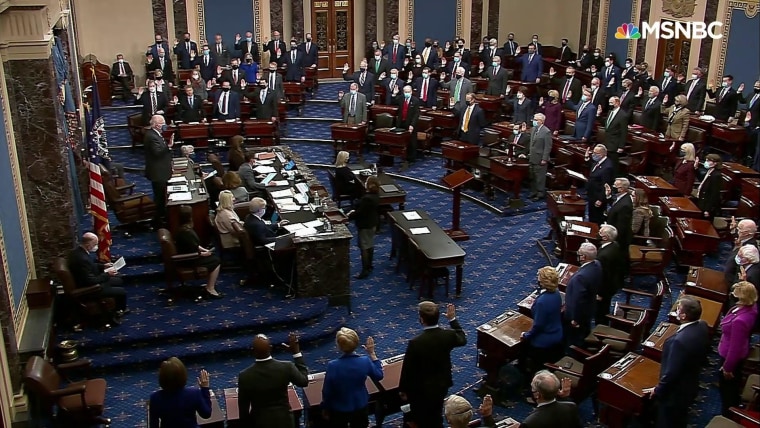WASHINGTON — Senate Republicans on Tuesday embraced the argument that trying a former president is unconstitutional, setting up a procedural escape hatch for lawmakers to acquit former President Donald Trump on a charge of inciting the Jan. 6 riot at the U.S. Capitol.
Forty-five Senate Republicans voted Tuesday to dismiss the trial as unconstitutional. The motion failed by a vote of 45-55, enabling the trial to move forward. But it signifies that a critical mass are leery of the trial and underscores the unlikelihood of finding the two-thirds majority needed to convict.
For many Republicans, an argument over the legality serves as a process-based justification to acquit Trump. The vote doesn't necessarily indicate the final outcome, as some senators who voted to dismiss haven't ruled out a conviction.
The approach could insulate fence-sitting senators politically from blowback among conservative voters who want them to stay loyal to Trump, without having to defend the merits of his actions that led to a deadly mob's storming the Capitol.
The motion, led by Sen. Rand Paul, R-Ky., was backed by Senate Minority Leader Mitch McConnell, R-Ky., whose vote could be influential in the outcome.
At least 17 Republicans will be needed to convict. But just five voted to proceed with the trial: Mitt Romney of Utah, Ben Sasse of Nebraska, Pat Toomey of Pennsylvania, Susan Collins of Maine and Lisa Murkowski of Alaska.
"I think it's pretty obvious from the vote today that it is extraordinarily unlikely that the president will be convicted," Collins told reporters. "Just do the math."
Sen. Mike Rounds, R-S.D., who went on NBC News' "Meet The Press" on Sunday to make his case that a trial would be illegal, said Tuesday that that is a growing view within the Senate GOP caucus.
Some of his colleagues agree.
"Clearly, a lot of members, me included, feel like a clear reading of the Constitution would prohibit us from even having this trial," Sen. Kevin Cramer, R-N.D., told reporters Tuesday. "My sense of it is is that a good number of senators will vote against conviction because they believe we shouldn't be doing this anyway, at all. And that's a reasonable conviction."
Senate Republicans heard from Jonathan Turley, a law professor at George Washington University, who was a GOP witness in Trump's first impeachment trial and influenced their decision to acquit him on charges of abuse of power and obstruction of Congress.
'It's constitutionally sketchy'
Paul said Turley spoke about the "'Brandenburg test' for speech," a reference to the standard established by a Supreme Court ruling on inflammatory speech that incites violence or illegal action, and he added that Turley "said there's not a chance in hell that you could convict Donald Trump in any court in the land of incitement."
Sen. Rick Scott, R-Fla., the chair of the party's Senate campaign arm, said about a trial: "It's vindictive. I think it's a waste of time. I don't think it's good for the country. I think it's clearly not unifying the country. And on top of that, it's constitutionally sketchy.
"I'm not going to support impeachment," he said.
The nonpartisan Congressional Research Service wrote in a report Jan. 15 that "most scholars who have closely examined the question have concluded that Congress has authority to extend the impeachment process to officials who are no longer in office."
Romney, the only Republican who voted to convict Trump last year, said he believes trying a former president is legal.
"The preponderance of opinion regarding the constitutionality of a trial of impeachment of a former president is saying that it is a constitutional process. And I intend to so vote," he told reporters.
Murkowski, who called on Trump to resign after the Capitol riot, said Tuesday that her review "has led me to conclude that it is constitutional" to try an ex-president.
The New York Times raised eyebrows when it reported Jan. 12 that McConnell had privately concluded that Trump committed impeachable offenses. He has since said he is undecided.
Some Republicans privately want to extricate themselves from Trump and chart a new path. But many are politically wary of taking a position that could offend GOP voters.
Senate Majority Leader Chuck Schumer, D-N.Y., has rejected the argument that the trial is unconstitutional, and he promised that it will go forward. He has said that if Trump is convicted, there will also be a vote to bar him from holding federal office again, as allowed under the Constitution.
The House-approved article of impeachment charges Trump with encouraging "lawless action" at the Capitol to overturn his election defeat, citing, among other things, his statement at the Jan. 6 rally, "If you don't fight like hell, you're not going to have a country anymore."
Some Republican senators, including Cramer, say Trump's actions didn't rise to the level of impeachment. Others may rest their objections on the procedural question.
Sen. Joni Ernst, R-Iowa, said Monday that Trump "exhibited poor leadership and holds some responsibility for the anarchy that ensued at the heart of our democracy."
But she said she is skeptical of the trial because "the president is no longer in office" and because impeachment shouldn't be "a tool for political revenge against a private citizen."
Julie Tsirkin, Frank Thorp V and Leigh Ann Caldwell contributed.
"What" - Google News
January 27, 2021 at 04:39AM
https://ift.tt/3a6hPHN
Most Republicans declare Trump's trial unconstitutional. Here's what that means for conviction. - NBC News
"What" - Google News
https://ift.tt/3aVokM1
https://ift.tt/2Wij67R
Bagikan Berita Ini
















0 Response to "Most Republicans declare Trump's trial unconstitutional. Here's what that means for conviction. - NBC News"
Post a Comment